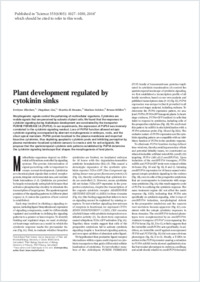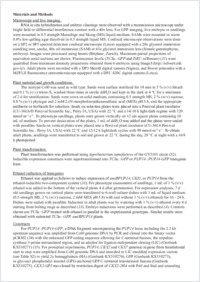Plant development regulated by cytokinin sinks
- Zürcher, Evelyne Zürich-Basel Plant Science Center, Department of Plant and Microbial Biology, University of Zürich, Switzerland.
- Liu, Jingchun Zürich-Basel Plant Science Center, Department of Plant and Microbial Biology, University of Zürich, Switzerland.
- Donato, Martin di Plant Biology, Department of Biology, University of Fribourg, Switzerland.
- Geisler, Markus Plant Biology, Department of Biology, University of Fribourg, Switzerland.
- Müller, Bruno Zürich-Basel Plant Science Center, Department of Plant and Microbial Biology, University of Zürich, Switzerland.
-
02.09.2016
Published in:
- Science. - 2016, vol. 353, no. 6303, p. 1027–1030
English
Morphogenetic signals control the patterning of multicellular organisms. Cytokinins are mobile signals that are perceived by subsets of plant cells. We found that the responses to cytokinin signaling during Arabidopsis development are constrained by the transporter PURINE PERMEASE 14 (PUP14). In our experiments, the expression of PUP14 was inversely correlated to the cytokinin signaling readout. Loss of PUP14 function allowed ectopic cytokinin signaling accompanied by aberrant morphogenesis in embryos, roots, and the shoot apical meristem. PUP14 protein localized to the plasma membrane and imported bioactive cytokinins, thus depleting apoplastic cytokinin pools and inhibiting perception by plasma membrane–localized cytokinin sensors to create a sink for active ligands. We propose that the spatiotemporal cytokinin sink patterns established by PUP14 determine the cytokinin signaling landscape that shapes the morphogenesis of land plants.
- Faculty
- Faculté des sciences et de médecine
- Department
- Département de Biologie
- Language
-
- English
- Classification
- Biological sciences
- License
-
License undefined
- Identifiers
-
- RERO DOC 277617
- DOI 10.1126/science.aaf7254
- Persistent URL
- https://folia.unifr.ch/unifr/documents/305261
Other files
Statistics
Document views: 129
File downloads:
- pdf: 244
- Supplementary material: 152

